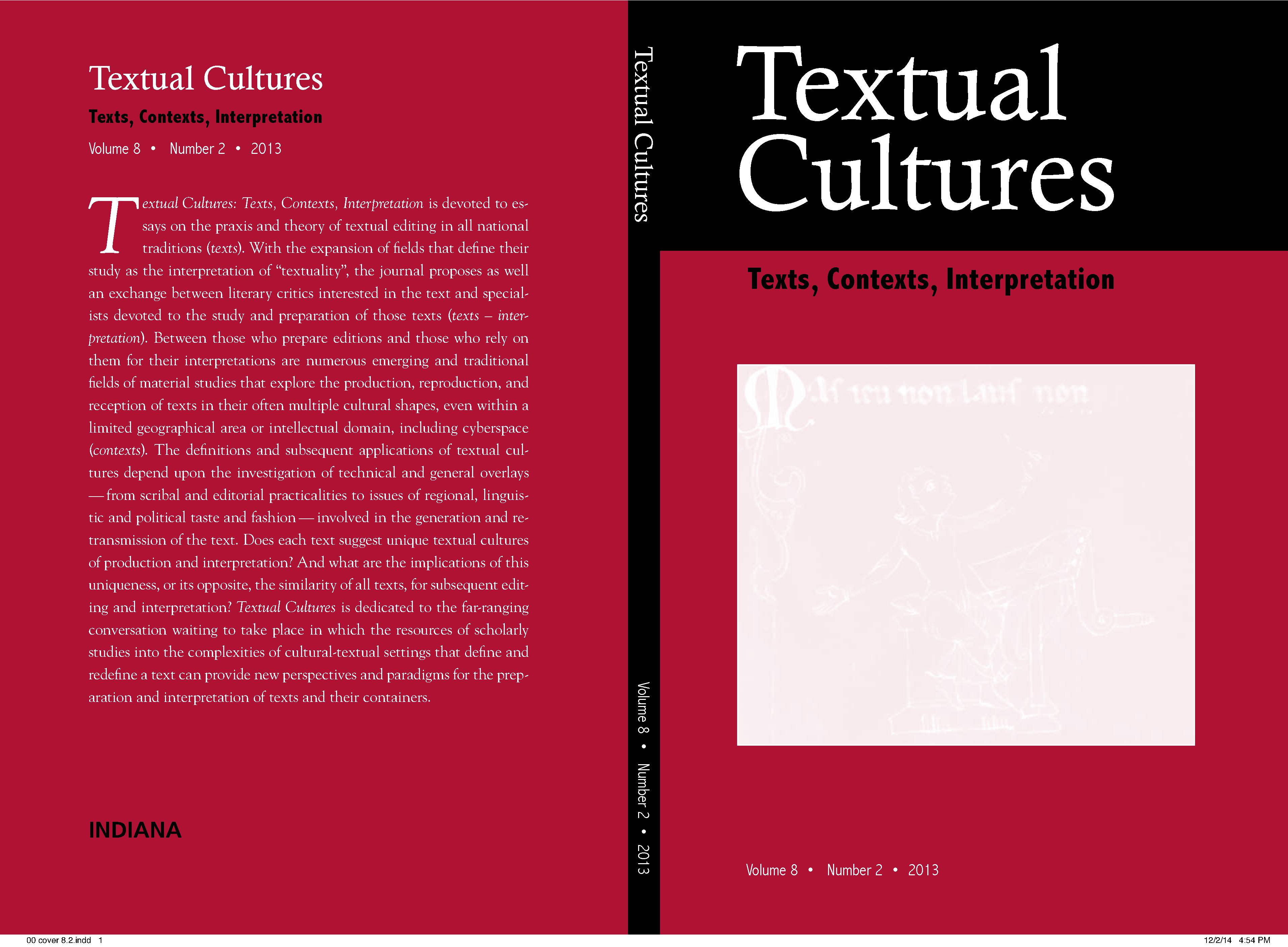Thibaut de Champagne and Lyric Auctoritas in MS Paris, BnF fr. 12615
Main Article Content
Abstract
Medieval composers and audiences alike took great stock in the cultural value of auctoritas, the notion that new compositions should closely follow the patterns set by previously accepted authors. The present study examines the concept as it applies to the composition of a particular manuscript: Paris, BnF fr. 12615. The codex underwent at least two, and most likely three, stages of compilation. Strategies of compilatio and ordinatio are examined to demonstrate how the compiler uses earlier songbooks dedicated to Thibaut de Champagne (d. 1253) to shape his own songbook and gradually move his anthology from aristocratic to urban, Artesian notions of auctoritas. Subsequent additions to 12615 enhance the original compiler’s scheme.
Downloads
Article Details
Authors who publish with this journal agree to the following terms:
- Authors retain copyright and grant the journal right of first publication with the work simultaneously licensed under a Creative Commons Attribution License (see:http://creativecommons.org/licenses/by/3.0/us/) that allows others to share the work with an acknowledgment of the work's authorship and initial publication in this journal.
- Authors warrant that their submission is their own original work, and that they have the right to grant the rights contained in this license. Authors also warrant that their submission does not, to the best of your knowledge, infringe upon anyone's copyright. If the submission contains material for which an author does not hold the copyright, authors warrant that they have obtained the unrestricted permission of the copyright owner to grant Indiana University the rights required by this license, and that such third-party owned material is clearly identified and acknowledged within the text or content of their submission.
- Authors are able to enter into separate, additional contractual arrangements for the non-exclusive distribution of the journal's published version of the work (e.g., post it to an institutional repository or publish it in a book), with an acknowledgment of its initial publication in this journal.
References
Badel, Pierre-Yves, ed. 1995. Adam de la Halle: Oeuvres complètes. Lettres Gothiques. Paris: Le Livre de Poche.
Bellenger, Yvonne,andDanielle Quéruel, ed.1987. Thibaut de Champagne. Prince et Poète au XIIIe siècle. Lyon: La Manufacture.
Berger, Roger. 1981. Littérature et société arrageoises au XIIIe siècle: Les chansons et dits artésiens. Arras: Mémoires de la Commission Départementale des Monuments Historiques du Pas-de-Calais.
Callahan, Christopher. 2014. Textual Cultures 8.2: 15–30.
Ev er is t, Mark. 2004. French Motets in the Thirteenth Century: Music, Poetry and Genre. Cambridge: Cambridge University Press.
Gally, Michèle. “Jeux partis de Thibaut de Champagne: poétique d’un genre mineur”. In Bellenger, Yvonne, and Danielle Quéruel, ed.1987. 89 – 97.
———. 2004. Parler d’amour au puy d’Arras. Orléans: Paradigme.
Grossel, Marie-Geneviève. 1987. “Thibaut de Champagne et Gace Brulé. Variations sur un même idéale”. In Bellenger and Quéruel, ed.1987. 107–118.
Haines, John. 1998–2002. “The Transformations of the Manuscrit du Roi”. Musica Disciplina 52: 5–43. http://dx.doi.org/10.1017/CBO9780511481819.
———. 2004. Eight Centuries of Troubadours and Trouvères: The Changing Identiy of Medieval Music. Cambridge: Cambridge University Press.
———. 2013. “The Songbook for William of Villehardouin, Prince of the Morea (Paris, Bibliothèque nationale de France, fonds français 844): A Crucial Case in the History of Vernacular Song Collections”. In Viewing the Morea: Land and People in the Late Medieval Peloponnese. 57–109. Edited by Sharon Gerstel. Cambridge, Mass.: Harvard University Press.
Huot, Sylvia. 1987. From Song to Book: The Poetics of Writing in Old French Lyric and Lyrical Narrative Poetry. Ithaca and London: Cornell University Press.
Jeanroy, Alfred. 1918. Bibliographie sommaire des chansonniers français du Moyen Age. New York: Burt Franklin.
K a r p, Theodore. 2001. “Colart le Boutellier”. In New Grove Dictionary of Music and Musicians. 92. Edited by Stanley Sadie. New York and Oxford: Oxford University Press.
Linker, Robert White. 1979. A Bibliography of Old French Lyrics. University, MS: Romance Monographs.
O ’Sullivan, Daniel E. forthcoming. “Words With Friends, Courtly Edition: The Jeux-Part is of Thibaut de Champagne”. In Games and Gaming in Medieval Literature. Edited by Serina Patterson. Basingstoke, Hampshire, UK: Palgrave Macmillan.
Raynaud, Gaston. 1844. Bibliographie des Chansonniers français des XIIIe et XIVe siè-cles. 2 vols. Paris: F. Vieweg.
Robert le clerc d’arras. 20 09. Les Vers de la Mort. Edited and translated by Roger Berger and Annette Brasseur.Textes Littéraires Français 600. Geneva: Droz.
Rosenberg, Samuel N. 1995. “Jeu Parti”. In Medieval France: An Encyclopedia. Edited by William Kibler, et al. New York: Routledge.
Spank e, Hans. 1955. G. Raynauds Bibliographie des altfranzösischen Liedes, neu bearbe-itet und ergänzt. Leiden: E. J. Brill.
Symes, Carol. 2007. A Common Stage: Theater and Public Life in Medieval Arras.Ithaca: Cornell University Press.
Viard, Jules, ed. 1932. Grandes Chroniques de France.Paris: Champion.
Wallensköld, Axel. 1925. Les Chansons de Thibaut de Champagne, roi de Navarre. Paris: Champion.
